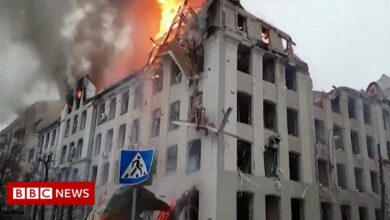Guterres calls for radical global financial overhaul to help Pakistan after deadly floods

“If there is any doubt about loss and damage, go to Pakistan,” he told the delegates in International conference on Pakistan adaptation to climate change. “There is a loss. There is damage. The devastation of climate change is real. From floods and droughts to tornadoes and torrential rain. And as always, the countries least responsible are the ones that suffer first.”
More than 33 million people affected
More than 33 million people were affected by floods in Sindh and Balochistan, which is considered by many to be Pakistan’s biggest climate disaster.
Even today, months after the initial emergency, floodwaters have only partially receded and the disaster is far from over for some 8 million people forced to flee rising waters, leaving more than 1,700 people die.
Catastrophic damage
More than 2.2 million homes were destroyed along with 13% of total medical facilities, 4.4 million acres of crops, more than 8,000 km of roads and other critical infrastructure – including some 440 bridges. .
The cost of helping communities affected in every way imaginable by the unprecedented monsoon rains in Pakistan started last June,”will exceed 16 billion dollarsand much more will be needed in the long term,” he said.
Speaking afterwards at a joint press event With the Pakistani Prime Minister, the head of the United Nations said it was a matter of justice, not just a gesture of solidarity, for Pakistan to receive full support. He said the conference only marked the beginning of that process. With CO2 emissions continuing to rise, he said he was “deeply disappointed that global leaders have not taken the action and investment required for this vital emergency.”
Vulnerable children affected
Parallel to the conference in Geneva, the UN children’s fund UNICEF highlights the ongoing human cost of emergencies in Pakistan.
“Up to four million children still live near polluted and stagnant flood watersrisk their survival and well-being,” the UN agency said.
UNICEF went on to say cases of acute respiratory infections have “jumped” in flood-affected areas, while the number of children suffering from severe acute malnutrition in the same region has nearly doubled. double from July to December compared with 2021, causing some 1.5 million young people still need life-saving nutrition intervention.

On November 3, 2022 in Jacobabad, Sindh Province, Pakistan, 15-year-old Sugra, whose home was destroyed in recent floods, was holding her brother, Fayaz.
Payout beyond the odds
Recalling the need to help developing countries like Pakistan become more resilient to the impacts of climate change, the UN chief stressed that the international banking system needs reform “to repair a fundamental mistake”.
He added: “Pakistan is dual victim of climate chaos and a morally bankrupt global financial system. That system routinely denies middle-income countries the debt relief and concessional financing needed to invest in disaster resilience. And so we need innovative ways for developing countries to access debt relief and concessional financing when they need it most.”
Speaking to reporters on the sidelines of the conference, Mr. Guterres affirmed that the UN has actively pursued the issue of ethical global financial reform.
Specifically, he explained that the Organization sought financial support for post-COVID development in conversations with the G7 and G20 industrialized country groups, as well as with the World Bank and the International Monetary Fund. economic (IMF).
The mechanics of money: Everything changes
“It is clear that the current system is biased,” he said. “This system was formed by a group of rich countries and it basically benefits the rich countries. So, first of all, we need to realize that we are facing a situation in the developing world in which countries are heavily indebted and countries do not have access to resources. the financial resources they need to be able, not only to address the dramatic challenges they face, but also to carry out Sustainable development goals.”
The UN secretary-general also called on multilateral development banks to “change the business model” by taking more risks and leveraging private finance more often.

Secretary General António Guterres (unseen), along with Muhammad Shehbaz Sharif, Prime Minister of the Islamic Republic of Pakistan, witnessed the impact of flooding in Sindh and Balochistan provinces.
Unfair advantage
“Private finance today is only accessible to many developing countries with very high interest rates that do not allow to solve their problems,” explains Mr. Guterres. “So multilateral development banks, even in addition to their loans, need to provide more security to bring in private financing at a reasonable cost, must be risk takers. first and consortium of financial institutions to support developing countries, and this is true for situations like… Pakistan.”
The UN Secretary-General also reiterated his call for developing countries to enjoy cheap loans like more industrialized countries.
“My country Portugal, even in this very difficult situation and very high debt-to-GDP ratio, can still get financing at 3 or 4% interest… I met with President Ruto of Kenya a few days ago and he told me that when they were trying to get into the market to finance the country, the best interest rate they got was 14%. It shows that there is a fundamental injustice in today’s system and that we need effective reform.”

UNICEF Sindh Field Office Chief Prem Chand observes 11-year-old Rahman wearing a UNICEF-supplied jacket during a winter kit distribution in Mitho Babbar village, Dadu district, Sindh province.
Alongside Mr. Guterres, Pakistani Prime Minister Muhammad Shehbaz Sharif explained why his country needs international solidarity more than ever.
“We need to help the 33 million people who have been deeply affected by floods back into their future,” he said. “Their families have to stand on their own two feet and they have to get back to life and earn a livelihood.”
‘Tomorrow, we can be people’
Representing the conference host Switzerland, Federal Councilor for Foreign Affairs Ignazio Cassis, argued that it was common sense to assist disaster-affected countries: “Today, it is you, Pakistan, need help. But tomorrow, it could be us, all of us. One thing is for sure: none of us are safe. We are all concerned about climate change, a global threat that requires a global response.”
Responding to the call for solidarity among nations, French President Emmanuel Macron joined the conference via video link to announce that €360 million had been pledged by France “to deal with the challenge of rebuilding resilience”. climate recovery and adaptation”.
However, the French president also noted that only 30% of the UN’s request for emergency funding had been granted, as soon as winter temperatures dropped.
Deep change
United Nations Development Program (UNDP) Administrator Achim Steiner highlighting the scale of the global threat posed by climate change and the relevance of the need for climate adaptation financing to developing countries:
“Look east, in Australia, unusual floods; looking west in California, extreme weather phenomena, looking to Europe, and people are wondering what happened to the snow in the winter, We live in a time of profound change.”
Commitment to support
The congress is over, delegates announced commitments totaling more than $9 billion to help with key post-disaster needs and ongoing humanitarian response, as part of Pakistan’s resilient recovery, recovery and reconstruction plan.
Immediate priorities include restoring the livelihoods of those affected, including the most vulnerable, along with basic services “in a resilient and sustainable manner,” the co-chairs said. said.




